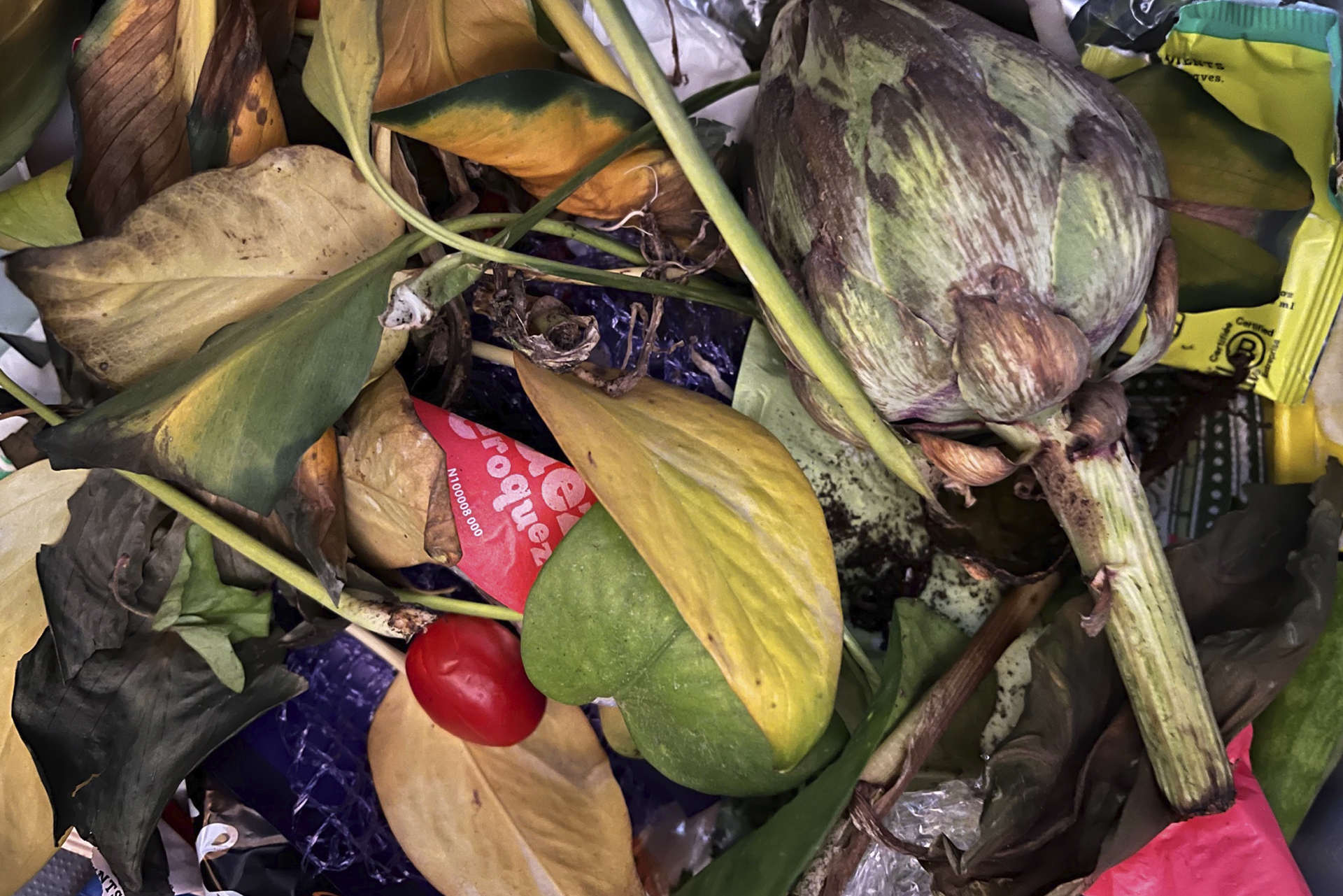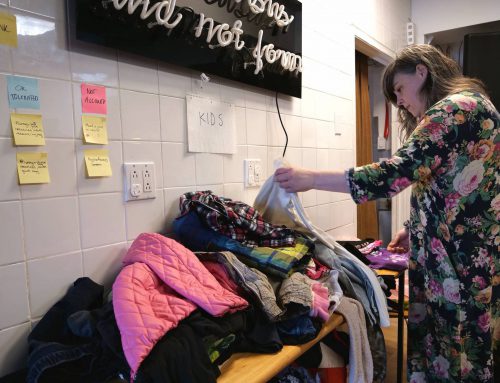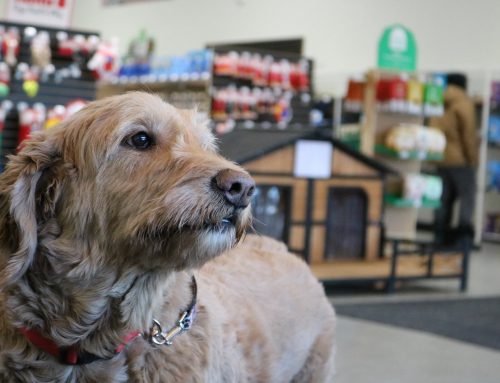BY Jillian Reynolds & Armen Agopian
Twice a week, piles of garbage bags line the sidewalks of the Plateau. They’re waiting to be transferred to a landfill. While trademark brown composting bins are scattered in front of homes, they’re rarely seen outside of businesses on Parc Avenue and St. Laurent Boulevard.
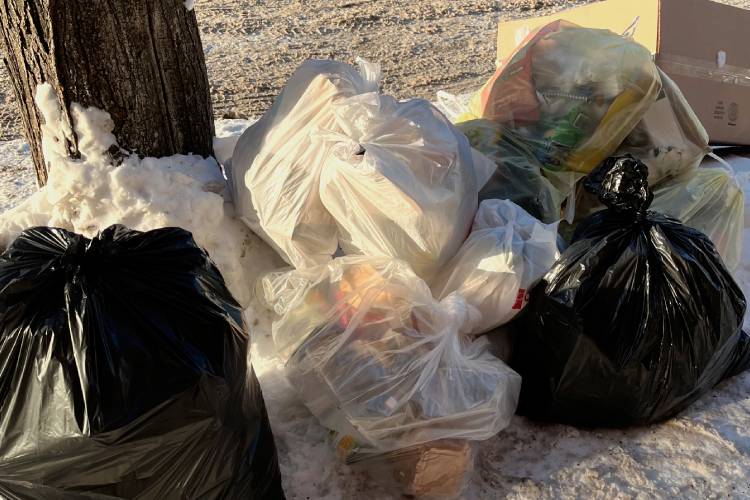
Garbage bags are a common feature of Parc Avenue, awaiting pickup to wind up in the landfill. Photo by Jillian Reynolds.
Late on Sunday evening, just before garbage day, an elderly woman named Marie-Laure forages for discarded food in the bins out front of a high-end grocery store on St. Laurent.
“You can’t believe what I’ve found in here,” she says, proudly displaying a pre-packaged salad with today’s date on the expiry label. “That’s dinner.”
Marie-Laure is one of nearly 15 percent of Canadians struggling with food security during the pandemic. She works part-time due to mental health challenges, so she doesn’t have the income to buy groceries every week. Since 2016, she’s resorted to dumpster diving as a way to survive.
And, unfortunately, there’s a lot to pick through.
“There isn’t free composting,” says Stephanie Mediros, a supervisor at the PA grocery store on Parc Avenue, “We have to pay for everything per weight.”
She explains that most of their imperfect produce is donated, but organisations usually facilitate pickups once a week, so delicate vegetables such as lettuce and salads are often thrown away. “We have somebody who comes to pick up for the Food Bank,” she says. “But the expired produce we throw out. We put it in the garbage.”
Moisson Montréal, the largest food bank in Canada, began their Food Recovery in Supermarkets Program in 2013. The primary goal is to redistribute perishable food items to people in need.
Richard Nadeau, general manager of Moisson Montréal, explains that the program was initially structured around collecting meat products from grocers. It then expanded to over 120 locations in Montreal with collections of fruits, vegetables, dairy and bread products as well.
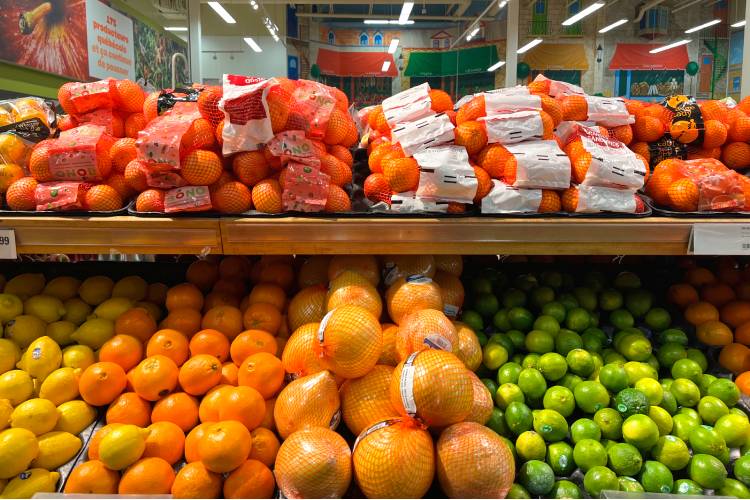
Grocery stores often practice “overstocking,” a method that results in excess food waste in order to entice customers to purchase certain items. Photo by Jillian Reynolds.
All the perishable items are brought back to Moisson Montréal’s facilities in Saint Laurent, where they’re tested, weighed, and recorded. They provide data back to the retailers who can adjust their orders accordingly to minimise future waste.
Yet not all of the items that are picked up from stores make it into the redistribution program. “The transportation of all this is in freezer trucks. As you may imagine, once a pineapple has spent two hours in the freezer it doesn’t look as much,” Nadeau says.
He explains that Moisson Montréal’s mission is primarily to feed the hungry, not actively fight food waste.
“If a driver comes back with tomatoes that are all mushy, we decline the donation,” he says.
In response to this issue, Moisson Montréal has created new initiatives, such as blanching and freezing produce so that some of their affiliates can distribute them.
They also sell unusable produce to farmers to use as feed or fertiliser.
“So we don’t have a formal program for compost, but we do try to reduce the waste.” He says that the organisation was able to recover 21 million kilograms of food last year, totalling to $117 million. Nadeau explains that whatever food they’re able to salvage from that amount is food that would otherwise end up in the landfill.
Infographic detailing the total amount of avoidable food waste in Canada. Data from Second Harvest’s annual report. Graph by Jillian Reynolds.
Food banks may be part of the solution to grocery waste, but they’re not always accessible or even productive, according to Lauren Mohammed, a student who regularly attends a food distribution program through Partage et Solidarité.
“I don’t qualify for [Moisson Montréal’s] food bank program,” she explains, due to her postal code and income, “So I have to go to a community-run non-profit.”
Partage et Solidarité collaborates with grocery stores to offer produce to people in need; however, Mohammed says that the quantity and quality of food she receives is barely enough to last two days.
“It’s good because they’re able to help people who aren’t in the system, or are in extreme circumstances,” she says. “But nobody would choose to go to the food bank because you’re literally just getting a bag of rotten food.”
Mohammed describes how she has to travel up to an hour to get to the ever-changing locations of Partage et Solidarité, which offer pre-packed bags of food to a long line of hungry Montrealers.
“You have to inspect all the food,” Mohammed says, “And there are garbage bins to throw out things that are rotting. I’d usually throw away at least half the bag, just because it’s inedible.”
Not all of the food that comes home with her ends up in the frying pan, either.
“The things that I do keep, they’re not fresh, and if I had money I wouldn’t eat them because I still have to cut away bits of mould. It’s really slim picking,” she says.
Some businesses have started their own composting initiatives, such as the Fairview Shopping Centre in Pointe-Claire. The mall mandates that every business in residence uses their composting system to reduce the overall food waste to a minimum.
An insight on commercial composting. Video by Armen Agopian.
Other stores are taking a more assertive stance against food waste. Blandine Mille is the co-owner of LOCO Plateau, a zero-waste grocery on Mont-Royal Avenue. She says that she helped open the store as a way to “Change our mindset and to do something everyday to change the world a bit.”
LOCO doesn’t use the same business model as most grocers, which tend to overstock produce in order to sell more. Mille says she’d rather have an empty shelf than excess waste in her store.
“The idea is to not take more, but take less, buy less, actually, to make sure we’re not throwing that away,” she says.
Mille says that they sell imperfect or wilting produce in a half price basket to incentivise people to buy them. Anything that isn’t picked up before it’s expiry is chopped on-site and packaged in jars to freeze and sold as soup or smoothie mix.
“We’re trying to be original!” She says.
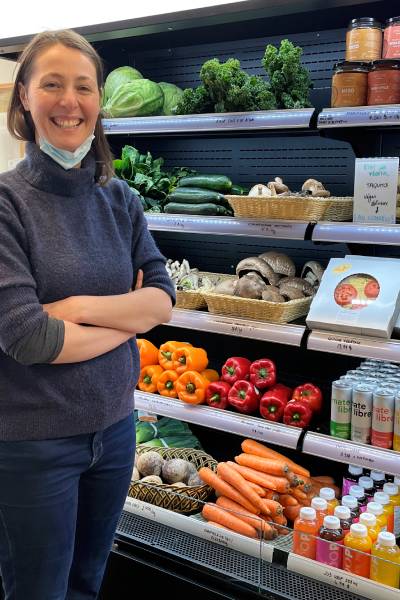
Blandine Mille shows off LOCO Plateau’s produce aisle, which purposefully offers a limited selection to avoid food waste. Photo by Jillian Reynolds.
LOCO is also participating in a pilot project with the Sociétés de Développement Commercial designed to provide businesses along Mont Royal with free composting. Mille feels they’re fortunate to have this service since commercial composting is unavailable to most businesses in the Plateau.
Yet she stresses that the business model they’re striving for doesn’t depend on a regular compost service, it’s all about minimizing any and all production of waste.
Nadeau’s values align with Mille’s here.
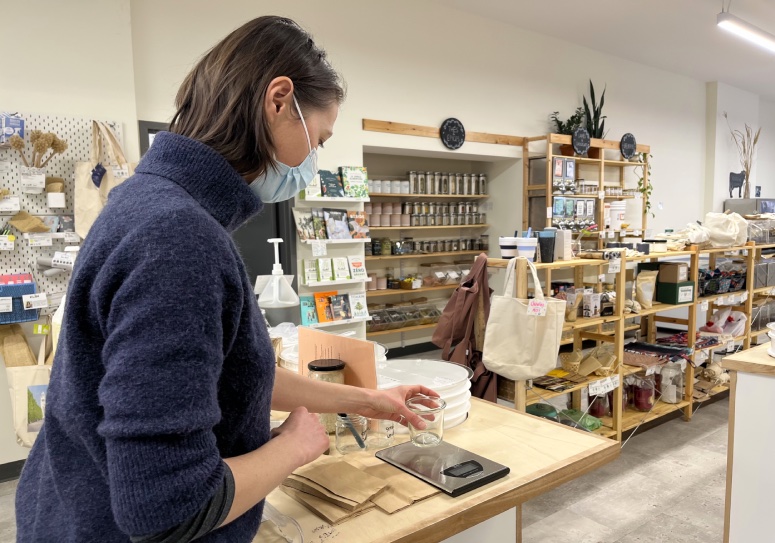
Blandine Mille demonstrates some of the food waste initiatives at LOCO. Photo by Jillian Reynolds.
“I believe that as a society we need to be better at creating less compost than getting better at getting rid of the compost. The added value for our society is to reduce our ecological footprint,” he says. “So we put pressure on the city to develop an overall compost recovery system, but as a society we’d be much better off if collectively we could reduce our footprint and be wiser with these things the earth is giving us. I believe that this is the upside for us as a community.”
